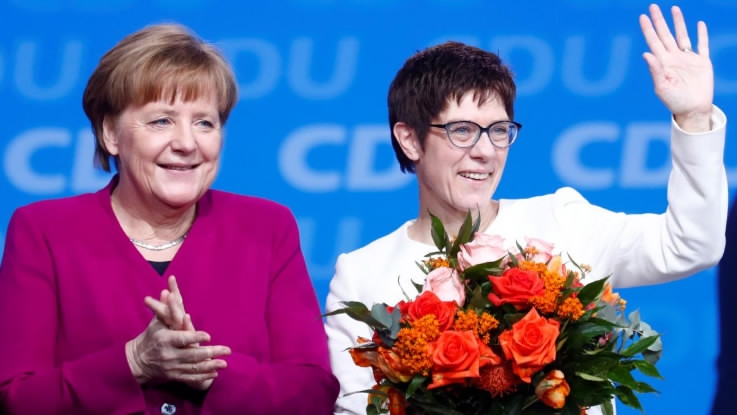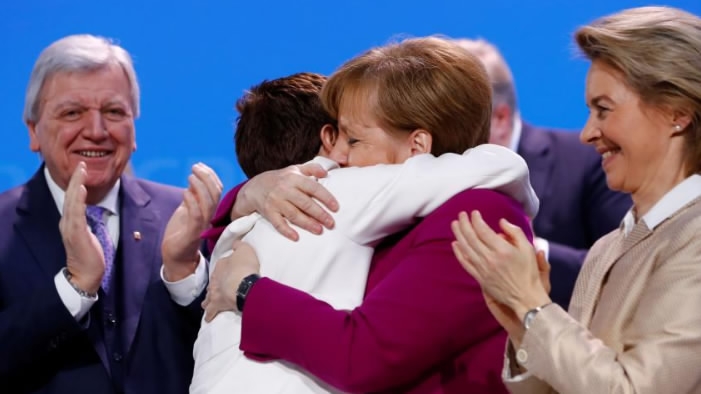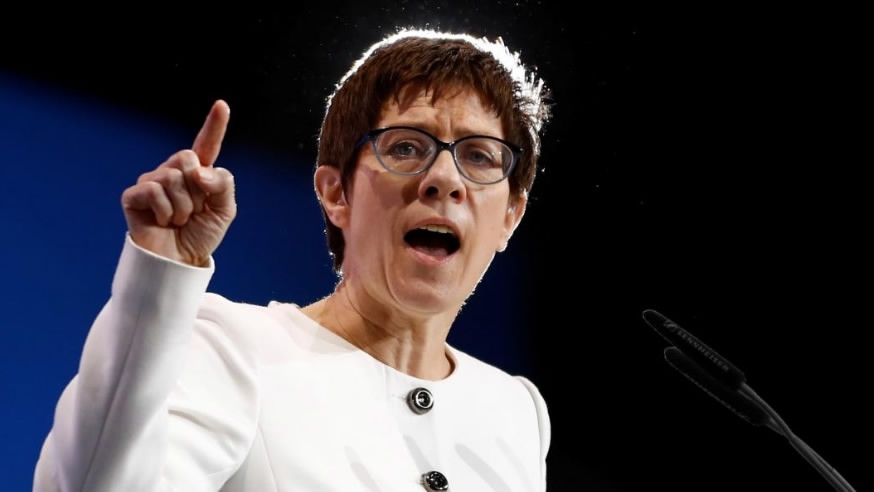
Politics
07:55, 27-Feb-2018
Germany's Merkel wins party nod to renew coalition with Social Democrats
CGTN

German Chancellor Angela Merkel’s conservatives on Monday approved a coalition deal with the Social Democrats (SPD), bringing closer a fourth term for her as well as an end to political limbo in Europe’s preeminent power.
The more formidable hurdle to ending a five-month political impasse comes next week, however. On March 4, results of a binding postal vote by members of the center-left SPD will be announced and they are far less certain.
“Now I can only say to the SPD that I hope many members feel the same responsibility for giving Germany a good government,” Merkel said in an interview with broadcaster RTL. “I think we can achieve a lot together for Germany and its people.”

German Chancellor Angela Merkel congratulates Annegret Kramp-Karrenbauer after she was elected secretary general during a Christian Democratic Union (CDU) party congress in Berlin, Germany, February 26, 2018. /Reuters Photo
German Chancellor Angela Merkel congratulates Annegret Kramp-Karrenbauer after she was elected secretary general during a Christian Democratic Union (CDU) party congress in Berlin, Germany, February 26, 2018. /Reuters Photo
The vote at a CDU congress followed Merkel’s announcement of her picks for a new, younger cabinet intended to revive the party, which has been riven by disagreements over how to respond to the Alternative for Germany (AfD) since losing votes to the far-right party in national elections in September.
The CDU’s youth wing has called for the party to renew itself in the wake of its worst election result since 1949 in September and Merkel, 63, stressed in her speech to delegates at the CDU gathering that younger faces were in the new team.
Earlier, she reassured CDU delegates that the new German government, which will steer Europe’s largest economy, would not take out any new debt, would avoid tax increases and would seek to renew the European Union.
Monday’s vote came as a poll showed support for both Merkel’s conservative bloc – which also includes the Bavarian Christian Social Union (CSU) – and the SPD rising.
Delegates cast aside whatever doubts they may have had in Merkel by voting overwhelmingly to appoint a centrist candidate she had hand-picked as the CDU’s new secretary-general.
Promising to lead a centrist mass party, Annegret Kramp-Karrenbauer, 55, dubbed “mini-Merkel” by some media, won the backing of more than 98 percent of delegates after making a pitch that opposed demands from Merkel’s critics for the party to move right to recapture votes lost to the nationalist right.

Annegret Kramp-Karrenbauer addresses a Christian Democratic Union (CDU) party congress in Berlin, February 26, 2018. /Reuters Photo
Annegret Kramp-Karrenbauer addresses a Christian Democratic Union (CDU) party congress in Berlin, February 26, 2018. /Reuters Photo
Her Catholic, western German background contrasts with Merkel’s Protestant, eastern roots. While socially conservative and known for opposing gay marriage, Kramp-Karrenbauer is also a strong supporter of the minimum wage and workers’ rights.
“I'm glad that there’s strong support for the coalition agreement, and that we now have a general secretary who got a super result,” Merkel said after the vote. “The work can begin.”
Apart from pledges on tax and debt, Merkel also committed the new government to ensuring fast Internet is available everywhere in Germany by 2025, raising research spending, creating 8,000 nursing jobs and taking a “zero tolerance” policy on security.
Merkel said conservatives secured wins in coalition talks with the SPD, including preventing what she called the “aberration” of a single health care system that the SPD had demanded to replace the current dual public-private system.
Source(s): Reuters

SITEMAP
Copyright © 2018 CGTN. Beijing ICP prepared NO.16065310-3
Copyright © 2018 CGTN. Beijing ICP prepared NO.16065310-3